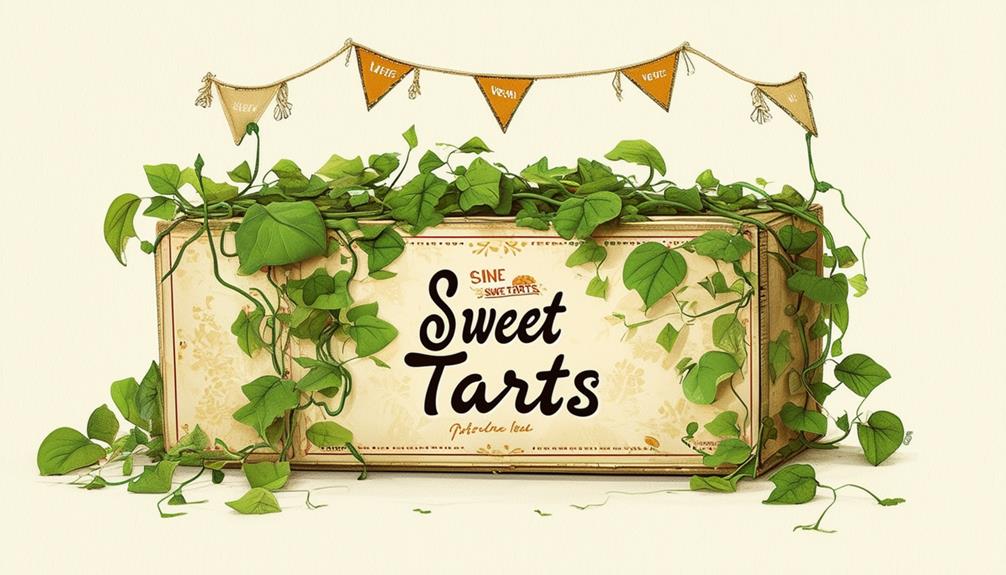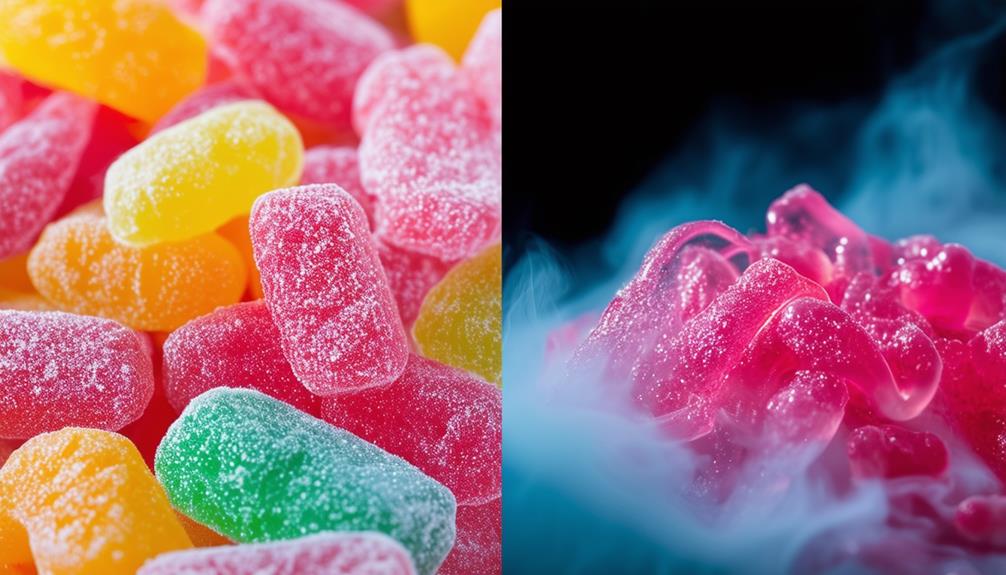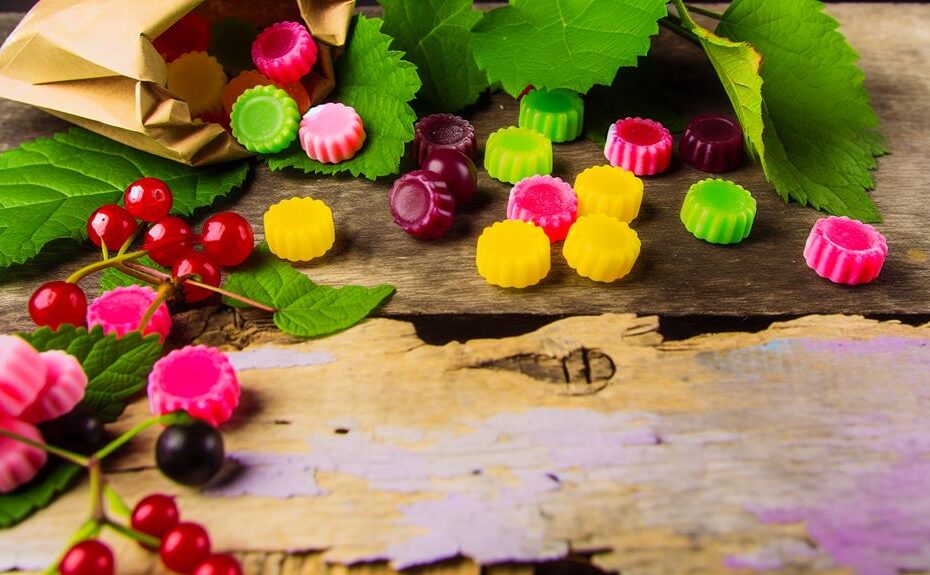You're probably thinking Sweet Tarts are a vegan-safe snack, and you're not entirely wrong. The original recipe does rely on plant-derived ingredients like dextrose and maltodextrin. However, it's not that simple. Some Sweet Tarts flavors might be hiding non-vegan ingredients, and it's important you know what to look out for. The question remains: can you really trust that your favorite tart is vegan-friendly? The answer lies in the fine print – and it's about to get a lot more complicated.
Sweet Tarts' Vegan Roots

Delve into the history of SweeTarts and you'll discover that the original recipe is surprisingly vegan-friendly. The Original SweeTarts, with ingredients like dextrose, maltodextrin, and natural flavors, are a vegan option for those seeking a sweet treat.
This is fantastic news for vegans, as it's not often that a popular candy is naturally vegan due to its original recipe. You might be wondering, 'What's the catch?' But, surprisingly, there isn't one – the Original SweeTarts are a vegan candy that's been around for years.
This makes them a great option for vegans who want to indulge in a sweet treat without compromising their dietary restrictions. As a vegan, you can enjoy these vegan treats without worrying about animal-derived products.
The vegan roots of SweeTarts are a welcome surprise, and it's great to see a popular candy brand offering vegan options.
Sweet Tarts' Hidden Gelatin
Now that you've delved into the vegan roots of Sweet Tarts, it's time to uncover the hidden ingredients that might make them non-vegan.
You might assume that Sweet Tarts are just a mix of sweet flavors, sugar, and corn syrup, but some varieties have a secret ingredient that changes everything.
Let's take a closer look at the flavor profiles and ingredients that might make Sweet Tarts unsuitable for a vegan diet.
Sweet Tarts Flavor Profiles
When you're scanning the candy aisle for your next sweet fix, you might assume that all Sweet Tarts flavors are created equal – but that's not the case.
As you investigate the different flavor profiles, you'll find that some contain hidden ingredients that might surprise you.
Let's take a closer look at the following flavors:
- Fruit Punch Flavor Profile
- Blue Raspberry Flavor Profile
- Orange Citrus Flavor Profile
Fruit Punch Flavor Profile
Digging into the Fruit Punch flavor of SweeTarts, you'll uncover a surprising ingredient: hidden gelatin. This animal-derived gelling agent makes the Fruit Punch Medley Chewy Fusions variant non-vegan.
As a vegan, it's important to check labels carefully, as gelatin can sneak into seemingly vegan-friendly treats like SweeTarts.
Blue Raspberry Flavor Profile
You'll find that the Blue Raspberry flavor of Sweet Tarts also contains hidden gelatin, making it another non-vegan variant in the Sweet Tarts family. Gelatin, a common gelling agent, is derived from animal collagen, making it non-vegan. Be cautious of this hidden ingredient when checking the ingredients list. Here's a breakdown of what to look out for:
| Flavor Profile | Gelatin Content | Vegan Certification |
|---|---|---|
| Blue Raspberry | Contains Gelatin | Not Vegan Certified |
| Fruit Punch | Contains Gelatin | Not Vegan Certified |
| Orange Citrus | TBD | TBD |
Remember to always check the ingredients list for hidden gelatin and look for vegan certification for a worry-free treat.
Orange Citrus Flavor Profile
Moving on to the Orange Citrus flavor, this variant is another popular Sweet Tarts flavor that you should be cautious about due to its hidden gelatin content.
As a vegan consumer, you'll want to avoid this flavor profile since gelatin, a non-vegan gelling agent, is typically present. Always check the ingredients list to ensure you're getting a vegan-friendly option.
Sugar, Corn Syrup, and
As you examine the ingredients list on your Sweet Tarts package, you might assume that sugar and corn syrup are harmless. However, you'll want to take a closer look at what's hiding beneath the surface.
Here are some unexpected elements worth noting:
- Modified Corn Starch
- Dextrose From Animal Bones
- Glycerin From Animal Fat
Modified Corn Starch
When scanning the ingredient list, you might overlook modified corn starch, but this common Sweet Tarts component can harbor a hidden non-vegan culprit: gelatin.
Some modified corn starch is processed with gelatin to improve texture and consistency.
As a vegan, it's crucial to verify the source of modified corn starch to make sure it's plant-based and free of hidden gelatin.
Dextrose From Animal Bones
You might be surprised to learn that dextrose, a common ingredient in Sweet Tarts, can be derived from animal bones, potentially harboring hidden gelatin.
This means some Sweet Tarts varieties may contain animal-derived dextrose, making them non-vegan.
Be cautious and check labels or contact manufacturers for ingredient sourcing information to determine the vegan status of your Sweet Tarts.
Glycerin From Animal Fat
Glycerin, a common ingredient in Sweet Tarts, can secretly harbor animal-derived components, putting vegans on high alert. Derived from animal fat, glycerin can contain hidden gelatin, making Sweet Tarts non-vegan. Be cautious, vegans! Research the source of glycerin to avoid hidden animal-derived components.
| Ingredient | Source | Vegan-Friendly? |
|---|---|---|
| Glycerin | Animal Fat | No |
| Gelatin | Animal Bones | No |
| Sugar | Plant-Based | Yes |
| Corn Syrup | Plant-Based | Yes |
Gelatin in Fruit Coatings

When you investigate the ingredients in Sweet Tarts, you'll find that gelatin is just one of several non-vegan components used in fruit coatings.
Now, let's take a closer look at two more animal-derived ingredients that might show up in your favorite candies: carmine and beeswax.
These substances, often used to create vibrant colors and appealing textures, can be major roadblocks for those committed to a plant-based lifestyle.
Carmine in Fruit Coatings
As you examine the ingredients of Sweet Tarts, you'll want to keep an eye out for some sneaky non-vegan ingredients in the fruit coatings. Specifically, you should be aware of carmine, a red pigment derived from crushed insects, and gelatin, which is often used in fruit coatings for candies.
Here are some other animal-derived ingredients you might find in fruit coatings:
- Confectioner's Glaze, which is made from shellac, a resin secreted by the lac bug
- L-Cysteine, an amino acid often derived from duck feathers
- Beeswax, which is used to give fruit coatings a glossy appearance
Confectioner's Glaze
You may be surprised to learn that Confectioner's Glaze, commonly used in candy coatings, is derived from insects and isn't vegan-friendly. Gelatin, another non-vegan ingredient, is often found in fruit coatings. Check labels for these ingredients and opt for vegan alternatives instead.
Carmine, a red dye from crushed insects, may also be present, making it crucial to scrutinize labels carefully.
L-Cysteine From Duck Feathers
When checking the ingredients of your favorite sweet treats, be on the lookout for L-Cysteine, a common additive derived from duck feathers that may render fruit coatings non-vegan. This additive is often used in fruit coatings, making certain sweet tart varieties non-vegan. Always inspect labels to make sure the ingredients align with your dietary preferences.
| Ingredient | Derived From | Vegan-Friendly? |
|---|---|---|
| L-Cysteine | Duck Feathers | No |
| Gelatin | Animal Collagen | No |
| Carmine | Crushed Insects | No |
| Confectioner's Glaze | Shellac | No |
| Fruit Coatings | Diverse | Depends on Ingredients |
Beeswax in Fruit Coatings
Besides L-Cysteine, another common fruit coating ingredient to watch out for is beeswax, which is used in candies like SweeTarts and isn't considered vegan since it comes from bees. As a vegan, you'll want to avoid it.
Beeswax is just one of several non-vegan ingredients used in fruit coatings, along with gelatin and carmine.
Beeswax in Fruit Coatings
As you investigate the world of fruit coatings, you'll find that beeswax and gelatin are just the tip of the iceberg. There are several other ingredients to be aware of, including some that might surprise you.
Let's take a closer look at a few of these hidden culprits:
- Shellac in Fruit Coatings
- Titanium Dioxide in Coatings
- Natural Red 4 (Carmine)
Shellac in Fruit Coatings
You might be surprised to learn that the shiny, colorful coating on your favorite fruits and candies often contains shellac, a resin secreted by the lac bug. This ingredient, along with gelatin and beeswax, is not vegan-friendly. Here's a comparison of these non-vegan fruit coating ingredients:
| Ingredient | Source | Purpose |
|---|---|---|
| Shellac | Lac bug | Gloss and protection |
| Gelatin | Animal collagen | Binding properties |
| Beeswax | Honeybees | Gloss and protection |
Remember to check labels carefully to avoid non-vegan products.
Titanium Dioxide in Coatings
What makes titanium dioxide a popular choice for candy coatings like Sweet Tarts is its ability to add a vibrant white color and opacity.
As a vegan, you should be aware that some fruit coatings might contain gelatin or beeswax, making them non-vegan. Always check labels for these ingredients to make informed choices about which candies to consume.
Natural Red 4 (Carmine)
Frequently, candy manufacturers use Natural Red 4, a vibrant red dye derived from crushed cochineal insects, to give their products a pop of color.
As a vegan, you should be aware that Natural Red 4 (Carmine) is non-vegan, along with gelatin and beeswax often found in fruit coatings, making them animal-derived and unsuitable for your diet.
Polishing Agent Confectioner's Glaze
When unwrapping a Sweet Tart, you mightn't think twice about the shiny coating, but it's actually achieved with Confectioner's Glaze, a polishing agent derived from the excretions of the lac insect, making it non-vegan.
This confectioner's glaze is commonly used on candies, including Sweet Tarts, to give them a glossy appearance.
As a vegan, it's crucial to be aware of this non-vegan ingredient in fruit coatings.
Vegan-Friendly Alternatives Abound
If you're craving a sweet and tangy treat that aligns with your vegan lifestyle, you'll find plenty of alternatives to SweeTarts that fit the bill.
Since not all SweeTarts are vegan, it's crucial to consider other options. The Chewy variants, for instance, contain egg albumen, making them non-vegan. Likewise, the Gummies, Sour Gummies, and Whipped & Tangy varieties contain gelatin, making them unsuitable for vegans.
Fortunately, you can indulge in vegan-friendly alternatives that satisfy your sweet tooth. Try Airheads Xtreme Sour Belts, Surf Sweets Sour Worms, YumEarth Organic Sour Beans, Trolli Sour Brite Eggs, or NERDS Sour Big Chewy Candy. These treats offer a similar sweet and tangy experience without compromising your vegan values.
With these alternatives, you can enjoy a guilt-free snacking experience that aligns with your lifestyle choices.
Conclusion
So, are Sweet Tarts vegan?
The answer is, it depends. While the original recipe is vegan-friendly, some flavors may contain hidden gelatin. Always check the ingredients list and verify the vegan certification before consuming.
If you're unsure, opt for vegan-friendly alternatives. With a little caution, you can enjoy Sweet Tarts while staying true to your vegan lifestyle.
